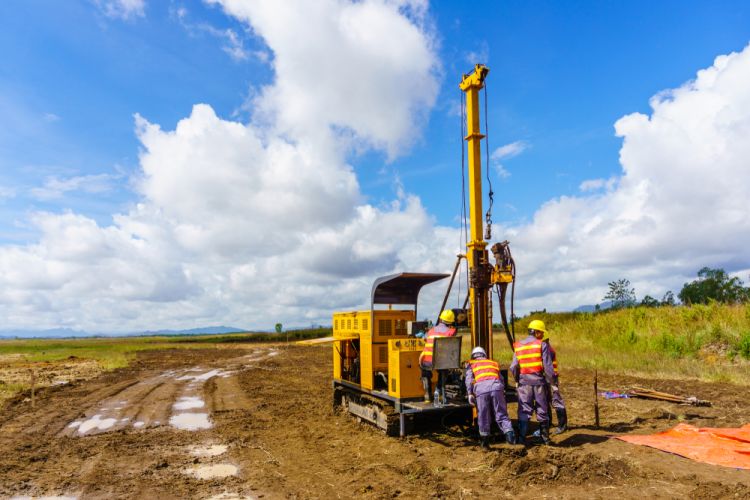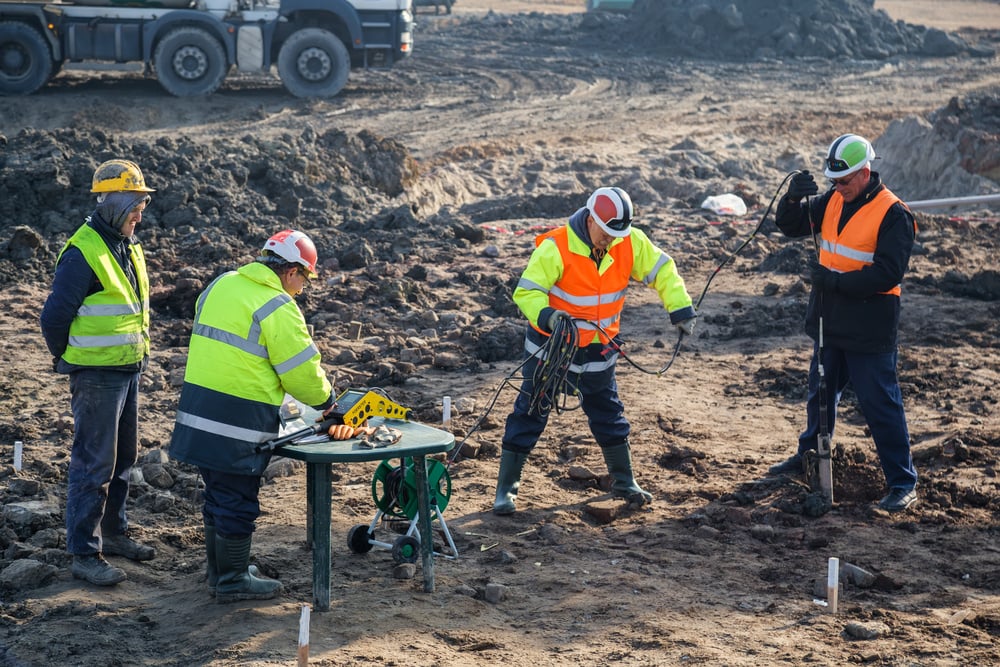The Basic Principles Of Specialized Geotechnical Engineering Solutions
Table of ContentsAll about Specialized Geotechnical Engineering SolutionsAll about Specialized Geotechnical Engineering SolutionsSpecialized Geotechnical Engineering Solutions Can Be Fun For AnyoneSpecialized Geotechnical Engineering Solutions Fundamentals Explained
They perform site examinations, accumulate samples, execute lab tests, and analyze data to examine the suitability of the ground for construction projects. Based upon their searchings for, geotechnical engineers provide referrals for structure layout, slope stability, keeping frameworks, and mitigation of geotechnical hazards. They team up with various other experts, such as architects, architectural engineers, and building teams, to guarantee that geotechnical factors to consider are integrated into the general task layout and application.
Foundation Style: Geotechnical designers play a critical role in creating foundations that can securely support the intended framework. They examine the soil problems and load demands to identify the suitable structure type, such as superficial foundations (e.g., grounds), deep foundations (e.g., stacks), or specialized strategies like dirt improvement. They think about elements such as negotiation limits, birthing ability, and soil-structure communication to create optimal structure designs.
Fascination About Specialized Geotechnical Engineering Solutions
Right here are some kinds of geotechnical designers: Structure Designer: Structure designers focus on creating and examining structures for frameworks - Specialized Geotechnical Engineering Solutions. They assess the dirt problems, lots needs, and website characteristics to determine the most appropriate foundation type and style, such as shallow structures, deep structures, or specialized methods like heap structures
They execute field testing, collect examples, and examine the accumulated data to characterize the soil buildings, geologic formations, and groundwater conditions at a site. Geotechnical Instrumentation Designer: Geotechnical instrumentation engineers concentrate on tracking and measuring the actions of dirt, rock, and structures. They install and preserve instrumentation systems that keep an eye on elements such as dirt negotiation, groundwater levels, incline motions, and architectural displacements to examine performance and give early cautions of prospective problems.
In the office environment, geotechnical engineers make use of specialized software application tools to perform calculations, develop layouts, and analyze data. Specialized Geotechnical Engineering Solutions. They prepare reports, evaluation project requirements, communicate with clients and group participants, and coordinate project activities. The office setting gives a helpful setting for study, analysis, and partnership with various other specialists entailed in the task
They often see project sites to carry out site examinations, evaluate geotechnical conditions, and gather data for evaluation. These visits include taking a trip to various places, occasionally in remote or challenging terrains. Geotechnical engineers may do soil tasting, conduct tests, and screen construction tasks to make sure that the geotechnical facets of the project are being carried out properly.
Fascination About Specialized Geotechnical Engineering Solutions
Geotechnical engineers also work in specialized geotechnical labs. In these facilities, they perform experiments, perform examinations on dirt and rock examples, and assess the design homes of the products. Geotechnical research laboratory engineers function extensively in these environments, handling testing equipment, operating tools, and recording information. They collaborate with other laboratory team to ensure exact and trusted testing outcomes.
Maintaining Walls: Developing wall surfaces that keep back soil to avoid landslides and give stability on sloped terrains. Embankments and Earthworks: Creating embankments for roads, trains, and dams to guarantee they stay secure under stress. The mining market counts heavily on geotechnical design to guarantee the security and durability of its operations.
With this in mind, we have designed our program to prepare students for success. The Geotechnical Design program at the College of Delaware offers possibilities for innovative research study and research study in: Dirt and rock technicians Soil-structure communication Constitutive modeling Computational geomechanics Structure and planet frameworks design Ground enhancement Slope stability and landslide stabilization Liquefaction of soils and quake engineering Laboratory characterization of geomaterials and soil support Ecological geotechnics Offered the strong demand for improvement to our nation's infrastructurethe American Society of Civil Engineers provided the united state
Geotechnical engineering is a branch of civil engineering; nevertheless, it involves making use of scientific approaches and concepts to gather and analyze the physical properties of the ground. Geotechnical designers are associated with all phases of the design of frameworks, from concept to building and construction. Their work is important in the layout and preparation procedure as they analyze the honesty of dirt, clay, silt, sand, and rock, before construction commencing.
Some Known Factual Statements About Specialized Geotechnical Engineering Solutions
This is adhered to by a ground investigation based upon the findings of the desk research study and involves trial pitting and tasting to discover any potential issues. Geotechnical designers function within multidisciplinary teams, supported by intermediate and jr designers in addition to by CAD service technicians. As an elderly geotechnical engineer on a hydro plant project, jobs may consist of participating in technological reviews (e.g., peer testimonials), tailings dam evaluations, dam security testimonials, and this various other research studies connected to the style and construction of mine waste facilities.
While some experts specialise solely in geotechnics, others might work under titles like engineering geologist or ground engineer within similar capacities. As a geotechnical designer, you'll need to: build and keep partnerships with clients and various other specialists involved in the website, throughout each projectmaintain safety standards on site bear in mind expense ramifications when you make recommendationsstudy geological maps and aerial photographs from an array of resources and from various time periodsexamine building and construction intends to see exactly how possible they are based on your understanding of the siteinvestigate risks official site or geological threats for the sitesearch for ecologically delicate functions, such as garbage dump beginning to develop valid and interpretive ground modelsplan field investigationsdrill and analyse samples of bedrock, soil, groundwater and extra products monitor other professionals on sitesolve technological issues as they arise, such as unanticipated structures at drill sitesmonitor conditions throughout and after building to see to it frameworks are secure in the short and long termadd data accumulated on website to your initial researchcreate geotechnical computations, illustrations, and 2 or three-dimensional computer versions translating the datamake recommendations concerning the proposed use of the website.
There are great deals of opportunities to satisfy new individuals, as you'll collaborate with a range of experts at every site. The work can be difficult as you may be responsible for the security of others while on site. There is additionally a high degree of economic responsibility, as the recommendations you make can have significant price effects.
